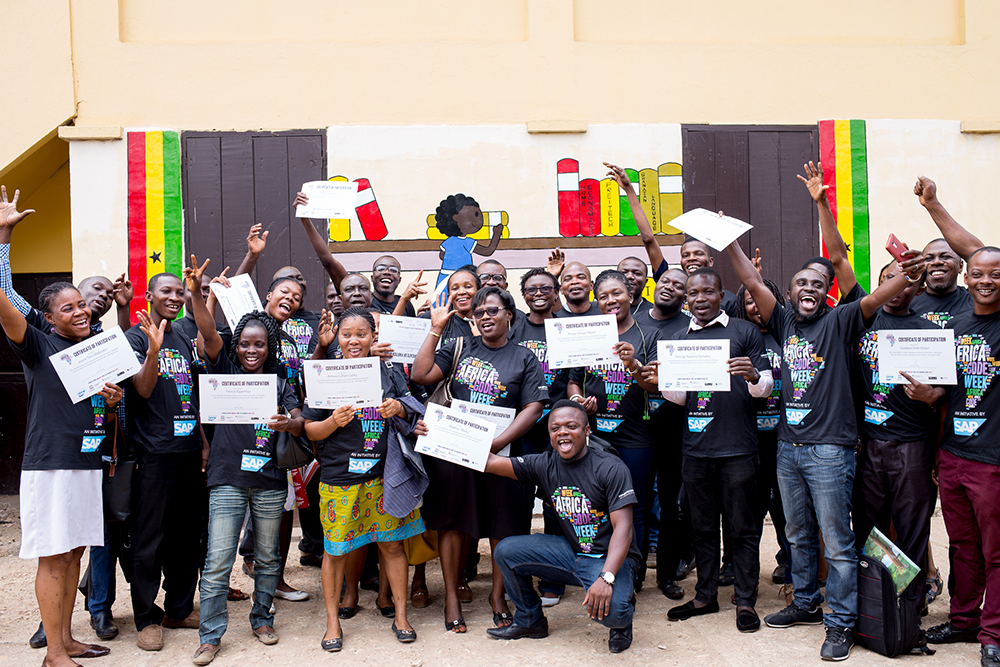More than 560 teachers took part in this year’s Africa Code Week (ACW) Train-the-Trainer workshops in Ghana as part of efforts to drive 21st century skills development among African youth.
Now in its fourth year, ACW instils 21st Century skills with a key focus on sustainable capacity-building and female skills development and training. Introduced in 2015 by SAP CSR EMEA, the initiative is now actively supported by key partners UNESCO YouthMobile, Google and the German Federal Ministry for Economic Cooperation and Development (BMZ), 15 African governments, over 150 partners and 100 ambassadors across the continent. All are joining forces to bridge the digital and gender skills gap in Africa, empowering youth with the skills they need to become key players in the digital economy.
Sunil Geness, Project Lead for Africa Code Week, said this year’s programme, which was held in Accra and Kumasi, allows for increased hours for teacher engagement to support improved local capacity building and the increased sustainability of the programme.
“Equipping local teachers with key skills and teaching materials to support the advancement of 21st century skills development forms part of our organisation-wide commitment to realising the ambitions of the UN Sustainable Development Goals (SDGs),” said Geness.
“Our curriculum is also focusing on going beyond only coding proficiency to fostering a deeper understanding of computational thinking and the possibilities of data science and analytics.”
The Train-the-Trainer (TTT) sessions form a bedrock of ACW’s sustainable impact across the continent by empowering teachers with skills and teaching materials that drive the advance of digital skills in the school curriculum. The sessions are critical to ACW which reach far beyond raising awareness of the importance of teaching digital skills to building capacity for sustainable impact, and inclusion of coding in school curricula in partnership with schools and governments.
Building sustainable digital skills capacity in West Africa
To date, ACW has introduced digital skills to more than 1.8 million children across 35 countries and aims to empower 70,000 teachers while impacting the lives of two million youth by 2020. This year, SAP has set a target of reaching 600,000 youth across 36 African countries during October, with actual dates to be set by each country to accommodate their school calendar.
Ghana was the most active of all West African countries in the 2017 iteration of ACW, with more than 138,000 local youth taking part, half of which were girls.
“Our objective is to empower 70 000 teachers and two million youth with 21st century skills by 2020,” added Geness.
“The active support of governments and partners will play a critical role in ensuring Africa’s youth is able to enjoy the benefits and opportunities of the 21st century digital economy.”
Ghana’s Minister of Education, Matthew Opoku Prempeh, said: “Our government is committed to improving access to education to all our students and have initiated projects such as the Secondary Education Improvement Project for Ghana to ensure all youth have access to quality education. Initiatives such as Africa Code Week and its Train-the-Trainer program supports our vision for an education system that provides relevant education that enables students to acquire relevant knowledge and skills to develop their potential.”
Strong partnerships improve impact
Ghana’s Train-the-Trainer programme is supported by Africa Code Week partner DreamOval Foundation, the CSR arm of DreamOval Ltd, in collaboration with the Ghana Education Service. According to Francis Ahene-Affoh, SVP of DreamOval Foundation, the Train-the-Trainer workshops provide an opportunity to bridge the knowledge gap through the creation, sharing and utilisation of knowledge in the education and technology sectors.
“Since our partnership with Africa Code Week commenced in 2016, more than 1,500 teachers and 180,000 students have received vital digital skills training to help them meet 21st century challenges,” he said.
“This year’s programme looks better than ever, with a focus on building capacity within Ghana to ensure our youth are ready to be active players on the global stage.”
Pedro Guerreiro, Managing Director: West Africa at SAP Africa, added: “Africa’s large and youthful working age population has the potential of transforming not only the continent but the world. As a purpose-driven organisation committed to realising the ambitions of the UN Sustainable Development Goals, supporting the development of digital skills among Africa’s youth is of paramount importance.
“As we enter an exponential age of new technologies, digital literacy and STEM-related skills development will be key determinants of success. We are grateful to our partners in the public and private sector for their support of Africa Code Week and the associated Train-the-Trainer sessions.”


